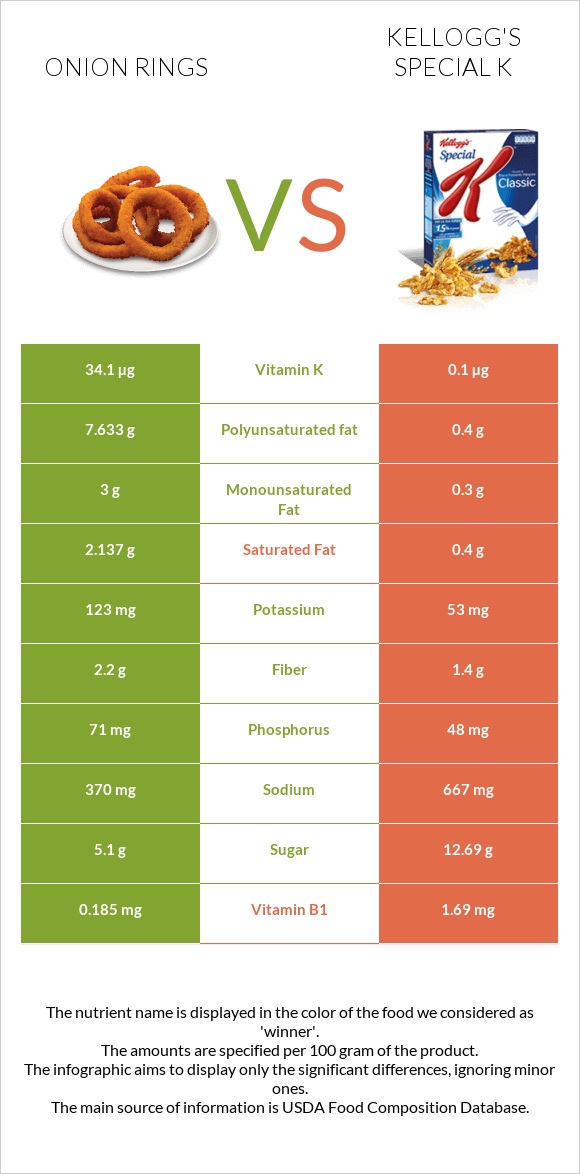Onion rings vs. Kellogg's Special K — In-Depth Nutrition Comparison
Compare
Summary of differences between onion rings and kellogg's Special K
- Onion rings has less vitamin B12, vitamin B6, iron, folate, vitamin B2, vitamin B3, vitamin B1, vitamin E, selenium, and vitamin C than kellogg's Special K.
- Kellogg's Special K covers your daily need for vitamin B12, 808% more than onion rings.
These are the specific foods used in this comparison Onion rings, breaded, par fried, frozen, prepared, heated in oven and Cereals ready-to-eat, KELLOGG, KELLOGG'S SPECIAL K.
Infographic

Infographic link
Mineral Comparison
Mineral comparison score is based on the number of minerals by which one or the other food is richer. The "coverage" charts below show how much of the daily needs can be covered by 300 grams of the food.
| Contains more MagnesiumMagnesium | +41.7% |
| Contains more CalciumCalcium | +34.8% |
| Contains more PotassiumPotassium | +132.1% |
| Contains more PhosphorusPhosphorus | +47.9% |
| Contains less SodiumSodium | -44.5% |
| Contains more ManganeseManganese | +∞% |
| Contains more IronIron | +2140% |
| Contains more CopperCopper | +145.2% |
| Contains more ZincZinc | +64.3% |
| Contains more SeleniumSelenium | +880.4% |
Vitamin Comparison
Vitamin comparison score is based on the number of vitamins by which one or the other food is richer. The "coverage" charts below show how much of the daily needs can be covered by 300 grams of the food.
| Contains more Vitamin B5Vitamin B5 | +∞% |
| Contains more Vitamin KVitamin K | +34000% |
| Contains more Vitamin CVitamin C | +4150% |
| Contains more Vitamin AVitamin A | +∞% |
| Contains more Vitamin EVitamin E | +3226.1% |
| Contains more Vitamin DVitamin D | +∞% |
| Contains more Vitamin B1Vitamin B1 | +813.5% |
| Contains more Vitamin B2Vitamin B2 | +1546.6% |
| Contains more Vitamin B3Vitamin B3 | +1575.3% |
| Contains more Vitamin B6Vitamin B6 | +5404.3% |
| Contains more Vitamin B12Vitamin B12 | +∞% |
| Contains more FolateFolate | +3809.1% |
All nutrients comparison - raw data values
| Nutrient |  |
 |
DV% diff. |
| Vitamin B12 | 0µg | 19.4µg | 808% |
| Vitamin B6 | 0.117mg | 6.44mg | 486% |
| Iron | 1.25mg | 28mg | 334% |
| Folate | 33µg | 1290µg | 314% |
| Vitamin B2 | 0.116mg | 1.91mg | 138% |
| Vitamin B3 | 1.349mg | 22.6mg | 133% |
| Vitamin B1 | 0.185mg | 1.69mg | 125% |
| Vitamin E | 0.46mg | 15.3mg | 99% |
| Selenium | 5.6µg | 54.9µg | 90% |
| Vitamin C | 1.6mg | 68mg | 74% |
| Vitamin A | 0µg | 500µg | 56% |
| Polyunsaturated fat | 7.633g | 0.4g | 48% |
| Vitamin K | 34.1µg | 0.1µg | 28% |
| Protein | 4.14g | 17.79g | 27% |
| Fats | 14.3g | 1.79g | 19% |
| Vitamin D | 0 IU | 134 IU | 17% |
| Vitamin D | 0µg | 3.3µg | 17% |
| Manganese | 0.348mg | 15% | |
| Carbs | 33.79g | 73.4g | 13% |
| Sodium | 370mg | 667mg | 13% |
| Copper | 0.073mg | 0.179mg | 12% |
| Starch | 25.58g | 11% | |
| Saturated fat | 2.137g | 0.4g | 8% |
| Monounsaturated fat | 3g | 0.3g | 7% |
| Vitamin B5 | 0.294mg | 6% | |
| Calories | 276kcal | 377kcal | 5% |
| Fiber | 2.2g | 1.4g | 3% |
| Phosphorus | 71mg | 48mg | 3% |
| Potassium | 123mg | 53mg | 2% |
| Zinc | 0.42mg | 0.69mg | 2% |
| Fructose | 1.26g | 2% | |
| Magnesium | 17mg | 12mg | 1% |
| Calcium | 31mg | 23mg | 1% |
| Net carbs | 31.59g | 72g | N/A |
| Sugar | 5.1g | 12.69g | N/A |
| Trans fat | 0.053g | 0g | N/A |
| Choline | 10.7mg | 11mg | 0% |
| Tryptophan | 0.07mg | 0% | |
| Threonine | 0.15mg | 0% | |
| Isoleucine | 0.214mg | 0% | |
| Leucine | 0.35mg | 0% | |
| Lysine | 0.151mg | 0% | |
| Methionine | 0.081mg | 0% | |
| Phenylalanine | 0.243mg | 0% | |
| Valine | 0.216mg | 0% | |
| Histidine | 0.109mg | 0% | |
| Omega-3 - ALA | 0.789g | N/A | |
| Omega-6 - Gamma-linoleic acid | 0.047g | N/A | |
| Omega-6 - Eicosadienoic acid | 0.003g | N/A | |
| Omega-6 - Linoleic acid | 6.346g | N/A |
Macronutrient Comparison
Macronutrient breakdown side-by-side comparison
Protein:
4.14 g
Fats:
14.3 g
Carbs:
33.79 g
Water:
46.37 g
Other:
1.4 g
Protein:
17.79 g
Fats:
1.79 g
Carbs:
73.4 g
Water:
3 g
Other:
4.02 g
| Contains more FatsFats | +698.9% |
| Contains more WaterWater | +1445.7% |
| Contains more ProteinProtein | +329.7% |
| Contains more CarbsCarbs | +117.2% |
| Contains more OtherOther | +187.1% |
Fat Type Comparison
Fat type breakdown side-by-side comparison
Saturated fat:
Sat. Fat
2.137 g
Monounsaturated fat:
Mono. Fat
3 g
Polyunsaturated fat:
Poly. Fat
7.633 g
Saturated fat:
Sat. Fat
0.4 g
Monounsaturated fat:
Mono. Fat
0.3 g
Polyunsaturated fat:
Poly. Fat
0.4 g
| Contains more Mono. FatMonounsaturated fat | +900% |
| Contains more Poly. FatPolyunsaturated fat | +1808.3% |
| Contains less Sat. FatSaturated fat | -81.3% |





